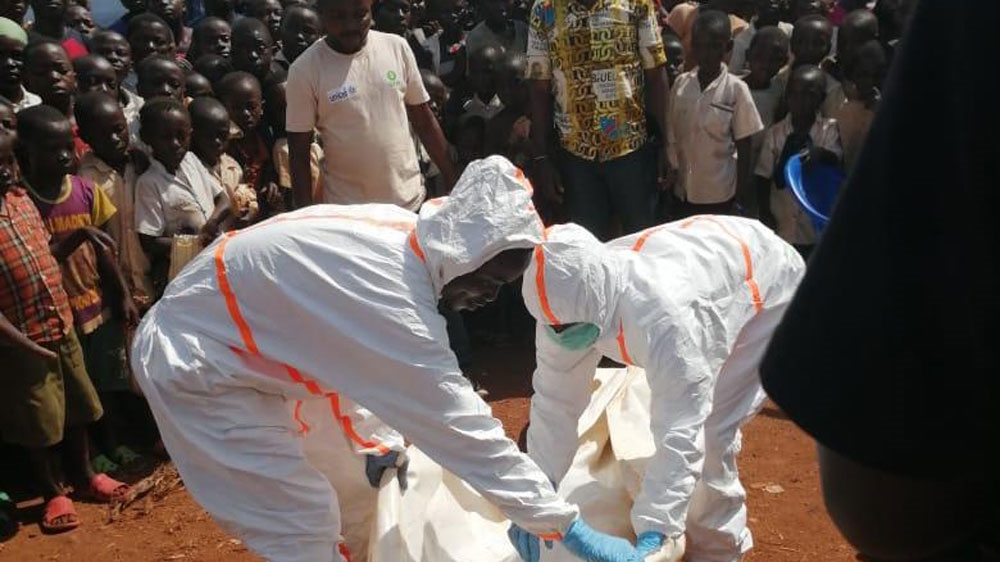
Beni, Democratic Republic of Congo - This city in northeastern DRC has been on a high Ebola alert for nearly a year and a half since the latest outbreak started, killing more than 2,000 people.
Although there is now a cure and vaccination that works, the disease is still as terrifying as it was when it was first discovered in the remote villages of the region.
At every corner one turns, there is water with disinfectants to wash your hands. Because the Ebola virus spreads through contact with blood or other body fluids of an infected person, correct hygiene checks the spread of the virus.
At every hand washing point, fever checks are conducted, with a person's high temperature setting off an alarm.
At other places in Africa, it could be just fever, flu or other tropical illnesses. But at the epicentre of the disease, Ebola is a real possibility.
And so we land in the region, bearing all that in mind.
We accompany Ebola contact tracers into villages where they check on people who had been in contact with those infected. We visit treatment centres that are frightening to be in, even for the strong-willed.
We speak to the brave residents who have been cured and are now looking after the sick, providing a much needed human touch to patients whose only contact has been the doctors in decontamination suits.
More than 1,000 people have survived the disease and are now believed to be immune. However, many survivors have also been ostracised.
Deep-seated superstition
We met Kambale Mundoleka in Mangina, a nearby town where the outbreak started.
"Doctors were on strike and people were dying fast. At first, some thought that someone had eaten a witchdoctor's cat and what was happening was because of that," he said.
Superstition is still deeply entrenched in many Congolese cultures.
Kambale lost 13 family members, including his mother to Ebola. His father was the first to be admitted at a treatment centre in the town.
Together with other survivors, they founded a support group to share feelings and visit others affected by the outbreak.
The World Health Organization (WHO) officials say the number of people falling sick has significantly reduced in the last few months.
For the first time in a long time, a treatment centre in Butembo, another Ebola hotspot 57km (35 miles) south of Beni, discharged its last Ebola patient.
New treatment, vaccines offer hope
Ebola is no longer incurable. Treatments have been successful 90 percent of the time when symptoms were detected early.
People who were given the vaccine manufactured by Merck, a German pharmaceutical company, also have a high chance of not getting infected. The drug has been approved by the European regulators.
A second vaccine is now being used on people who do not live in high-risk areas. Made by another pharmaceutical giant, the US-based Johnson and Johnson, the vaccine is being given to people living along the border with Rwanda among others.
The latest vaccine is still in its experimental stage and undergoing the last phase of its clinical trial. Nearly half a million Congolese have been targeted for the study on the vaccine's efficacy. The process may take up to 10 months.
But some people we talked to are worried about possible long-term side effects. The fact that it is administered in two doses several weeks apart does not make it ideal for people who travel often.
'Ebola business'
The international medical organisation, Doctors Without Borders (MSF), is implementing the vaccination programme in coordination with the Congolese government.
The MSF vaccination project coordinator Veronique Urbaniak told Al Jazeera that getting volunteers to come back for a second injection could be a challenge, but health workers have spent months educating people.
"The vaccine is safe. It has already been tested on a small sample of people elsewhere. Our Ebola coordinator ... would not have approved it if it was harmful to the people," said her counterpart at the DRC ministry of health, Dr Stephane Hans Mustafa.
Ebola vaccinations in the Central African country have also been controversial and political. Former Health Minister Oly Ilunga lost his job earlier this year after reportedly opposing the US vaccine study.
Some people even coined a phrase to express their scepticism over the research into the virus being driven by a financial agenda, calling it "Ebola business".
'Medical miracle'
That said, it's mostly the stories of hope that took us to the epicentre of the epidemic that has devastated communities.
We found a perfect example in Baby N (real name withheld to protect her privacy), born prematurely and lying in an incubator in a biologically secure unit at the Beni treatment centre.
Doctors call her a "medical miracle". Her mother died after birth. Her placenta, the umbilical cord, the baby's saliva - all tested positive with the Ebola virus.
But Baby N's blood, even after numerous tests, is negative. Doctors say it is a phenomenon that will likely be documented in science journals.
The Ebola story in DRC is not just about fear, superstition and politics. It is also about real people, such as Baby N, who baffles doctors and grows stronger every day in her little incubator.







